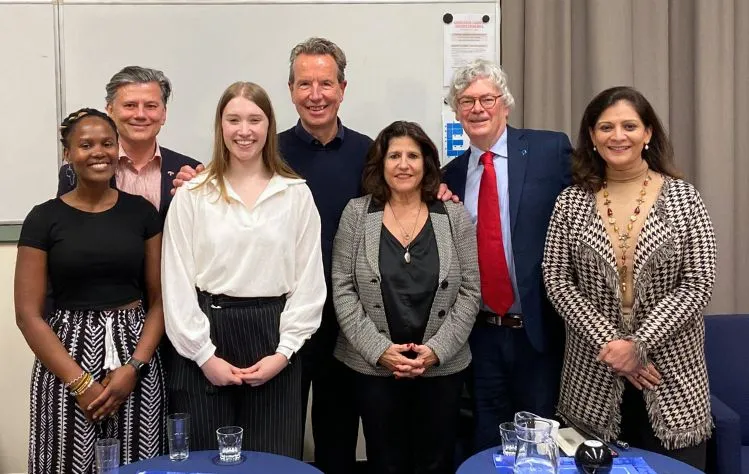Political Café: Webster Leiden Students Compare Perspectives on US Election Results
January 25, 2025

On Dec. 14, 2024, the International Relations Club and SIR Eta Alpha, led by Hildah Ayesigye, a graduate in international relations, organized a roundtable political café event themed “The Future of America: Comparative Perspectives on the U.S. Election Results and the Road Ahead.”
The buzz of intellectual debate brought together a distinguished panel of experts from Webster Leiden’s International Relations department, including Dr. Jill E. Adler, Dr. Piotr Perczynski and Professor Daniel Russel. Students, faculty and members of the public filled the room, reflecting a high level of interest in the unfolding political landscape of the United States and its global repercussions.
An Evening of Insightful Discourse
This roundtable discussion offered attendees a range of interdisciplinary insights into the outcome of the 2024 U.S. presidential election and its extensive implications. Panelists with expertise in international law, political theory, grant writing and fundraising examined how the election may impact global security, international diplomacy and ongoing conflicts, such as in Ukraine.
The café commenced with a cordial reception from Leiden Campus Director, Professor Jean Paul Van Marissing. He expressed his appreciation for the substantial turnout and underscored the significance of democracy, analyzing the U.S. elections as not merely a domestic event but a global phenomenon with far-reaching implications across nations. In setting the tone for the evening, Van Marissing delineated a crucial point, emphasizing that understanding the future of America is fundamentally intertwined with understanding the future of global politics in this interconnected world.
One of the central themes of the evening was the new presidency’s potential role in shaping the trajectory of recent wars, including the war in Ukraine. One of the panelists provided an analysis that might influence the United States' future regional decisions, highlighting the critical need for multilateral cooperation: "The U.S. cannot resolve the conflict alone; however, its leadership — or lack thereof — will significantly sway the international community’s approach to peace negotiations.”
The moderator delved into the broader philosophical underpinnings of American foreign policy, adding to the discussion. She posed questions about whether the election results signify a return to traditional U.S. values on the global stage or a shift toward a more isolationist stance. The panelists’ insights drew nods from the audience as they underscored the fine line the new administration must tread between addressing domestic priorities and fulfilling international obligations.
Reflections from Attendees
The audience members were not merely passive observers but active participants in the evening’s dialogue. During the Q&A session, students, faculty and members of the public raised questions that broadened the discussion to include the role of religion and the media in shaping perceptions of election results and the potential for bipartisan cooperation under the new administration. A student attendee remarked, “It’s rare to find such a forum where we can unpack these complex issues with experts who make them accessible and relevant to our lives.”
One member of the public shared their perspective on the U.S. elections as a Dutch citizen. “As an outsider, I’m struck by how deeply the results affect everyone, even those of us outside the U.S. This café has helped me see the connections between American policy and global challenges like security and migration.”
The event wrapped up with closing comments from Academic Director Dr. Sheetal Shah, who expressed her gratitude for the success of the student-led initiative. In her speech, she also emphasized the importance of political psychology, and encouraged the audience to regard it as a crucial element in their political engagements.
Reflecting on the evening, Ayesigye shared her thoughts on the event. “Our goal was to spark meaningful conversations about the future of America and its place in the world. Judging by the energy in this room tonight, I believe we’ve achieved that.”
Looking Forward
The U.S. elections have often been a mirror reflecting not only the state of American society but also the broader trends shaping the world. From the war in Ukraine and Russia to global security and international cooperation, the implications of the 2024 election extend far beyond the borders of the United States. The Webster Leiden political café served as a space to unpack these complexities, offering attendees a richer understanding of the challenges and opportunities that lie ahead. Amidst this, the International Relations Club at Webster Leiden continues to serve as a hub for meaningful dialogue, hoping that the road ahead, though challenging, is one that can be navigated together.
